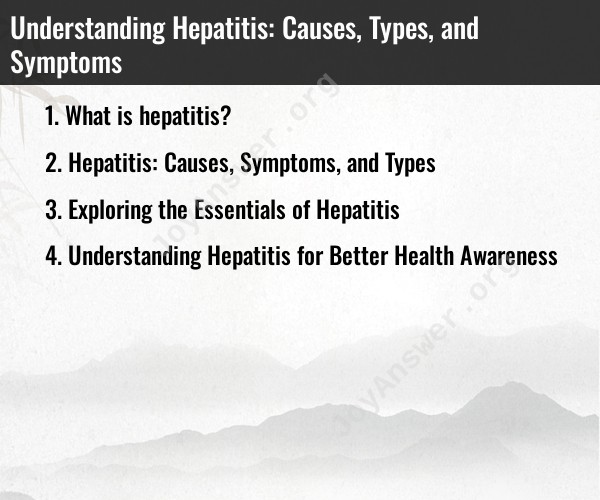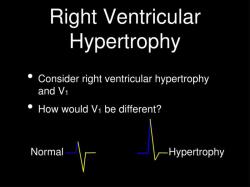What is hepatitis?
Hepatitis is an inflammatory condition that affects the liver. It can be caused by various factors, including viral infections, autoimmune diseases, alcohol abuse, and exposure to certain toxins. Hepatitis can range from mild and self-limiting to severe and chronic, potentially leading to liver damage or failure. There are several types of hepatitis, but the most common forms are viral hepatitis.
Here are the key types of viral hepatitis:
Hepatitis A (HAV): Hepatitis A is usually contracted by consuming contaminated food or water or through close contact with an infected person. It is often a short-term, self-limiting illness, and a hepatitis A vaccine is available for prevention.
Hepatitis B (HBV): Hepatitis B is transmitted through contact with the blood or other body fluids of an infected person. It can be acute (short-term) or chronic (long-lasting) and may lead to severe liver disease. The hepatitis B vaccine is highly effective for prevention.
Hepatitis C (HCV): Hepatitis C is typically spread through contact with infected blood, most commonly through sharing needles or receiving blood transfusions before proper screening was implemented. It often becomes chronic and can lead to liver cirrhosis or cancer. Antiviral medications are available to treat and cure hepatitis C in many cases.
Hepatitis D (HDV): Hepatitis D is a unique virus that can only infect people who are already infected with hepatitis B. It typically worsens the symptoms of hepatitis B and can lead to severe liver damage.
Hepatitis E (HEV): Hepatitis E is usually transmitted through contaminated water and is more common in developing countries. It is typically a self-limiting disease, similar to hepatitis A.
The symptoms of hepatitis can vary depending on the type of hepatitis and the stage of the infection. Common symptoms of acute hepatitis may include:
- Fatigue
- Jaundice (yellowing of the skin and eyes)
- Dark urine
- Abdominal pain
- Nausea and vomiting
- Loss of appetite
- Clay-colored stools
- Muscle and joint pain
- Fever
In some cases, hepatitis can be asymptomatic, meaning that individuals may not experience noticeable symptoms.
Chronic hepatitis can lead to more severe liver-related complications, such as liver cirrhosis and hepatocellular carcinoma (liver cancer).
Prevention of hepatitis primarily involves vaccination (for hepatitis A and B), practicing safe sex, avoiding sharing needles, and following proper food and water hygiene practices in regions where hepatitis is prevalent. For those with chronic hepatitis, antiviral medications and medical monitoring can help manage the condition and prevent further liver damage. If you suspect you have hepatitis or are at risk, it's important to seek medical advice for diagnosis, treatment, and guidance on how to manage the condition.
Hepatitis: Causes, Symptoms, and Types
Hepatitis is an inflammation of the liver. It can be caused by a number of things, including viruses, toxins, and autoimmune diseases. There are five main types of hepatitis: A, B, C, D, and E.
Causes of hepatitis
The most common cause of hepatitis is a virus. The hepatitis A, B, and C viruses are the most common causes of viral hepatitis. These viruses can be transmitted through contact with infected blood or bodily fluids.
Other causes of hepatitis include:
- Toxins: Certain toxins, such as alcohol and drugs, can damage the liver and cause hepatitis.
- Autoimmune diseases: Autoimmune diseases, such as lupus and rheumatoid arthritis, can cause the body's immune system to attack the liver.
Symptoms of hepatitis
The symptoms of hepatitis can vary depending on the cause and severity of the disease. Some people with hepatitis may have no symptoms at all, while others may experience mild to severe symptoms.
Common symptoms of hepatitis include:
- Fatigue
- Nausea and vomiting
- Abdominal pain
- Jaundice (yellowing of the skin and eyes)
- Dark urine
- Pale stools
If you experience any of these symptoms, it is important to see a doctor right away.
Types of hepatitis
There are five main types of hepatitis: A, B, C, D, and E. Each type of hepatitis has its own unique characteristics.
- Hepatitis A: Hepatitis A is a highly contagious virus that is spread through contact with infected fecal matter. It can cause mild to severe illness, but it usually goes away on its own within a few weeks.
- Hepatitis B: Hepatitis B is a serious virus that can cause chronic liver disease. It is spread through contact with infected blood or bodily fluids.
- Hepatitis C: Hepatitis C is a serious virus that can also cause chronic liver disease. It is spread through contact with infected blood.
- Hepatitis D: Hepatitis D is a virus that only infects people who are already infected with the hepatitis B virus. It can cause more severe liver disease than hepatitis B alone.
- Hepatitis E: Hepatitis E is a virus that is spread through contact with contaminated food or water. It is most common in developing countries.
Exploring the Essentials of Hepatitis
Hepatitis is a serious disease that can have a significant impact on your health. It is important to be aware of the causes, symptoms, and types of hepatitis so that you can protect yourself and your loved ones from the disease.
Understanding Hepatitis for Better Health Awareness
Hepatitis is a serious disease, but it is also a preventable disease. There are a number of things you can do to protect yourself from hepatitis, including:
- Get vaccinated against hepatitis A and B. There are vaccines available for hepatitis A and B. These vaccines are safe and effective, and they can help to protect you from these serious viruses.
- Practice good hygiene. Wash your hands frequently with soap and water, especially after using the bathroom and before preparing food.
- Be careful about what you eat and drink. Avoid eating raw or undercooked shellfish, and drink only bottled or boiled water when traveling to developing countries.
- Use clean needles. If you inject drugs, use clean needles and syringes.
If you have any risk factors for hepatitis, it is important to see your doctor for regular checkups. Your doctor can test you for hepatitis and provide you with information about how to protect yourself from the disease.












